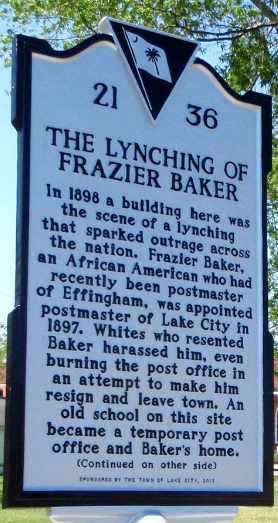South Carolina
Postmaster Lynching

Early on the morning of February 22, 1898, a lynch mob burned down the post office in Lake City, South Carolina, and pointed their firearms at the front door. The only way out of the post office/home of postmaster Frazier B. Baker and his family was through an area where shooting was occurring. Baker and his daughter Julia, age 2, were both murdered by the mob. His wife Lavinia, two of his children, Rosa and Cora, and his son, Lincoln, were hit by gunfire. His other two daughters, Sarah and Millie, were unharmed.
Months of violence against Baker followed his appointment as the first African-American postmaster in the predominantly white city of Lake City in July 1897. Baker had bullets fired at him and his post office burnt down for no apparent reason. Residents complained about his work as postmaster, but postal inspectors found no evidence to support their claims. It was a normal reaction to the changing times in the South for the community’s racial prejudice to boil over into rage and intense hatred of an African American in a prominent post.
Following the sad incident, there was widespread public uproar and charitable donations made to the Baker family. The federal district attorney and postal inspectors took up the Frazier Baker murder investigation when the state declined to charge the mob. The most difficult part of the case was finding credible witnesses. Residents remained silent, either because they were afraid to report their neighbors or because they had no desire to see their neighbors punished. Thirteen individuals were arrested and charged, and two of them have promised to testify in exchange for immunity.
Twenty-four charges, including “a conspiracy to hurt and harass Frazier B. Baker in the free exercise” of his civil rights, were filed against those responsible for the brutal murder of a government employee. The mail destruction count was not one of the 23 counts that included conspiracy charges. The trial began on April 10, 1899, in Charleston, South Carolina’s Federal District Court. The all-white jury reached not guilty verdicts for three of the men, but could not agree on culpability for the remaining eight. In this instance, the court ruled a mistrial, and the federal prosecutors did not pursue retrial.












You must be logged in to post a comment Login